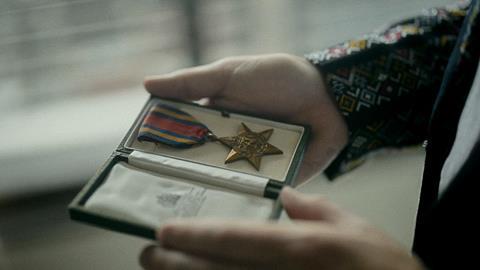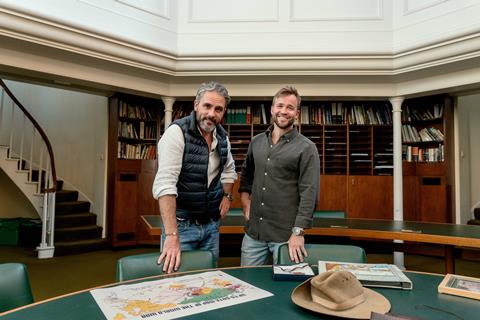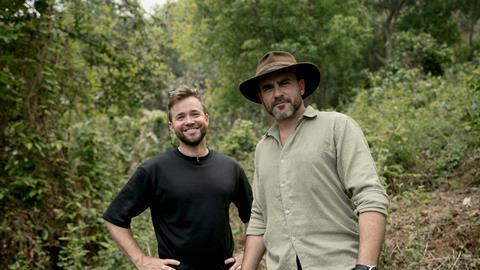How the explorer and historian Alex Bescoby raced to recognise veterans from a largely forgotten chapter of WW2
Tracking down surviving soldiers from the Second World War is an increasingly difficult task, but when those veterans live in remote locations thousands of miles from the UK, it becomes even tougher.
Yet Levison Wood had good reason to look back more than 80 years to the Burma Campaign, one of the war’s most brutal theatres.
His grandfather had spent the last two years of the conflict in Asia, fighting alongside British and Commonwealth troops in some of the harshest, most unforgiving terrain going. Like many others, he spoke little of his experiences once the war ended and the sacrifices made by veterans in this part of the world was fast fading from memory.
It was partly this lack of recognition that drove Wood and historian Alex Bescoby to Asia in a bid to meet surviving soldiers and pay tribute, recording their journey in Sky History’s 1 x 45-minute documentary The Last Burma Star, which debuts in the UK on Sunday.
Time was a big factor - with many veterans over 100 years old, we were racing against the clock to get this story told before it was too late
The VJ Day 80th anniversary special follows Wood and Bescoby as they search for a 100-year-old soldier to deliver his long-overdue Burma Star medal and a special message from King Charles III, before it’s too late.
“This story matters now more than ever because we’re rapidly losing the last living veterans of the Burma Campaign, a chapter of World War II that’s been largely forgotten by history, overshadowed by the European war and VE Day,” Wood tells Broadcast International.
“For many of the Commonwealth soldiers, including those from remote regions like Northeast India, recognition has come late, if at all. This was our chance to pay tribute while we still can.”
That mission was far from straightforward, however. Logistically, filming in remote parts of Northeast India came with its own set of hurdles, Wood explains, with difficult terrain and limited infrastructure requiring local knowledge and trust to navigate.

“Finding the veterans or their families in such remote regions, many without formal addresses or easy ways to communicate, was incredibly challenging,” the adventurer explains. “Time was another big factor. With many veterans over 100 years old, we were racing against the clock to get this story told before it was too late.”
There was also the ongoing civil war in Myanmar to deal with. With access to foreigners blocked, Wood and Bescoby had to sidestep the country and instead focused efforts in Northeast India, particularly in the Chin and Naga areas, regions that were directly impacted by the Burma Campaign and where many Commonwealth soldiers were recruited from.
“Even there, it took extensive groundwork to find and connect with surviving veterans. Many of them live in remote hill villages, and we had to work closely with local researchers, elders, and community leaders to track people down,” Wood explains.
One of the most powerful moments in the film is when Wood meets Cpl Con Herh, a 100-year-old Chin soldier, and presents him with his long-overdue Burma Star.
“That encounter alone justified the entire journey,” Wood says, who admits that retracing his grandfather’s time in the region made the experience “deeply personal”.
“Walking the same paths he might have walked 80 years ago gave me a real sense of what he and so many others went through. It added emotional weight to the entire project and made me even more determined to bring these stories to light,” he explains.
Bescoby, producer and co-presenter of the film, describes the film as “a labour of love for all involved” and adds that it also has contemporary relevance.
“Burma/Myanmar holds a special place for both Levison and myself and we hope this film is a tribute to both the heroes of the past who come from there, but also – with Myanmar once again torn apart by war - the heroes of the present who continue their struggle.”

‘Heroism and historical injustice’
The doc is being sold globally by TVF International, and director Poppy McAlister points to its importance given that it is a conflict “that has often been overlooked in Western narratives”.
And while the show celebrates the success of the local fighters during WWII, it also explores Britain’s dark colonial past, a tension that Wood admits he was “very conscious of”.
On one hand, Wood and Bescoby wanted to honour the bravery and sacrifice of the local soldiers who fought alongside British and Commonwealth forces.
“On the other hand, we couldn’t ignore the legacy of colonialism,” Wood continues. “The fact that many of these men were fighting for an empire that didn’t always treat them with the respect or recognition they deserved, and the fact that so many communities in Burma felt abandoned by Britain after the war.
“Telling this story meant engaging with both sides: the heroism and the historical injustice. Our goal was to tell a fuller, more honest version of the campaign, one that includes the voices and experiences of those often left out of the narrative.”
The result is a doc that tells the story not only of the incredible search for a 100-year-old man in some of Asia’s most remote terrain, but also pays tribute to the sacrifices made and the importance of recognition. “It is exactly the kind of documentary that reminds us why international storytelling matters,” McAlister says.
- The Last Burma Star goes out on Sky History in the UK on Sunday, 9 November at 9pm









No comments yet